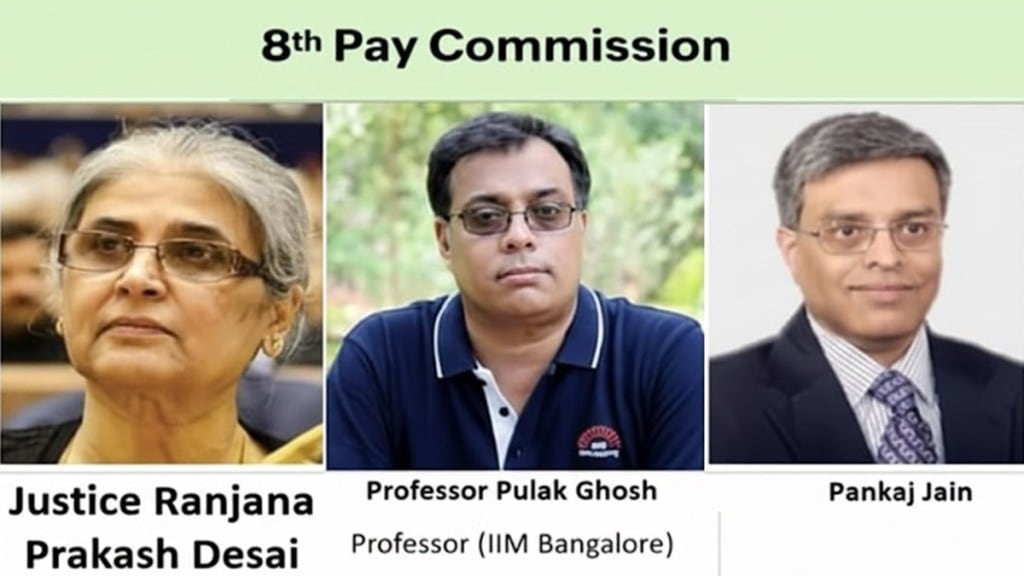Millions of central government employees and pensioners, who had been eagerly waiting for some progress on the Pay Commission front, may have heaved a sigh of relief this week. The government has approved the Terms of Reference (ToR) and finalised the names of the panel members for the 8th Central Pay Commission.
All eyes are now on the panel – led by chairperson Justice Ranjana Prakash Desai, along with IIM Bangalore Professor Pulak Ghosh (part-time member) and Petroleum Secretary Pankaj Jain (member secretary) – which will have its task cut out to complete the review work within 18 months and submit the final report. The challenge will be to revise the salaries and pensions of central government employees in line with the country’s current economic realities without putting too much fiscal burden on the exchequer.
The trio brings together a rare blend of judicial wisdom, academic insight and administrative experience. The team is a well-rounded mix expected to guide the Pay Commission’s complex deliberations.
Many would now be curious to know more about these three eminent individuals who have been entrusted with the challenging task of addressing the aspirations of millions of employees and pensioners.
So, let’s take a closer look at their backgrounds and achievements.
Justice Ranjana Desai: Chairperson
Justice Ranjana Desai, a former Supreme Court judge known for her deep understanding of law and governance, is named the chairperson of the 8th Pay Commission. Desai, now 76, is a graduate from Elphinstone College and did her LLB from Government Law College, Mumbai.
Desai was appointed as a judge of the Bombay High Court in 1996 and later elevated to the Supreme Court of India, where she served from 2011 to 2014. Over the years, she has headed the Delimitation Commission of India and also the Press Council of India.
Millions of central government employees would be hoping that her vast experience in the judiciary would be instrumental in arriving at balanced and employee-friendly recommendations.
Professor Pulak Ghosh: Part-time Member
The government has appointed Professor Pulak Ghosh, a renowned faculty member at IIM Bangalore and an accomplished data scientist, as a part-time member of the 8th Pay Commission. His expertise spans technology, data analytics, and artificial intelligence (AI). His skills will help the Commission view employee-related issues from a fresh, data-driven perspective and address them through modern policy initiatives.
His inclusion in the three-member panel underscores the government’s intent to tap into his academic depth and policy insight to enhance employee welfare in the long run.
Pankaj Jain: Member-Secretary
Pankaj Jain, a 1990-batch IAS officer of the Assam-Meghalaya cadre, will be serving as the Member-Secretary in the 8th Pay Commission. Jain is currently the Secretary in the Ministry of Petroleum and Natural Gas.
Jain, an MBA and also a qualified cost accountant, is well-equipped to analyse the financial implications of pay and pension revisions. As a Member-Secretary of the panel, Jain will ensure smooth coordination with various ministries, oversee the preparation of reports, and ensure that recommendations are both affordable and sustainable for the government’s finances.
How the 8th Pay Commission compares with the 7th Pay Commission
The 8th CPC follows the 7th Pay Commission, which was set up in February 2014 under the chairmanship of Justice Ashok Kumar Mathur. The 7th Pay Commission had four members — including IAS and economic experts. Other than the chairman were Vivek Rae and Dr. Rathin Roy as members and Meena Agarwal as Secretary. The panel submitted its report to the government in November 2015, and its recommendations were approved by the NDA government in June 2016. Though, it was implemented retrospectively from January 1, 2016.
Fitment factor and other metrics suggested by the 7th Pay Commission
While the 7th Pay Commission introduced a fitment factor of 2.57 times, simplified pay matrices, and merged pay bands to streamline salaries, it faced criticism for being too conservative in addressing inflation and living cost increases.
Now, with the 8th CPC coming a decade later, expectations are running high. Employees are hoping for a higher fitment factor, better alignment of allowances with inflation and stronger pension protection amid rising expenses.
Unlike earlier Commissions that relied primarily on economic data and fiscal constraints, the 8th CPC is expected to integrate data analytics and cost-efficiency modelling, thanks to the inclusion of experts like Professor Ghosh and cost accountant Pankaj Jain.
What to expect from the 8th Pay Commission
The Terms of Reference (ToR), already approved by the government, will help the Commission shape its recommendations. However, the salary and pension hike decision has to be made based on the country’s economic conditions, fiscal prudence, impact on state finances, burden of non-contributory pensions, and pay parity with the private sector.
This means the panel will try to balance employee welfare with budget discipline. However, given the post-pandemic inflation and the rising cost of living, there’s a strong case for a substantial salary hike this time.
With an 18-month window to submit its report, the Commission’s recommendations will influence not only household incomes but also government spending, fiscal deficit targets, and consumption patterns across the economy.
As Justice Ranjana Desai’s team begins its work, government employees across the country are watching closely — hopeful that this time, cost-of-living realities will find fair reflection in the 8th Pay Commission’s report.


